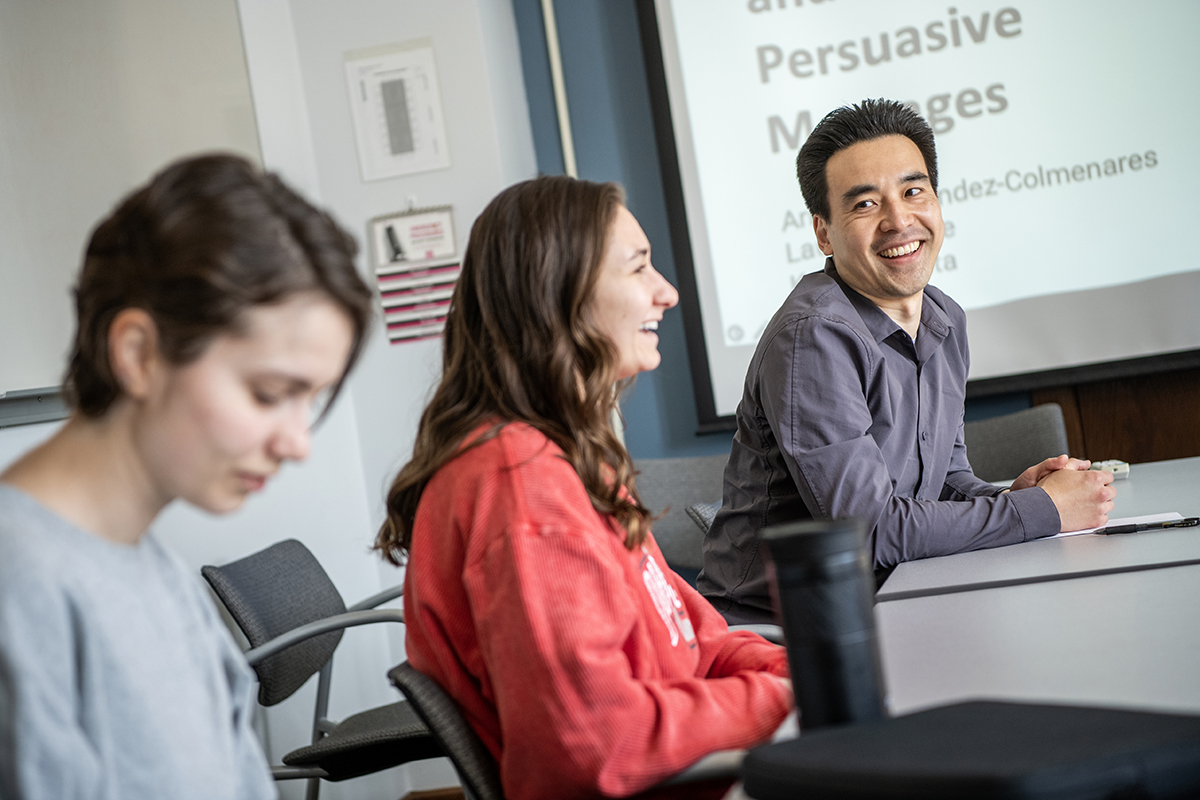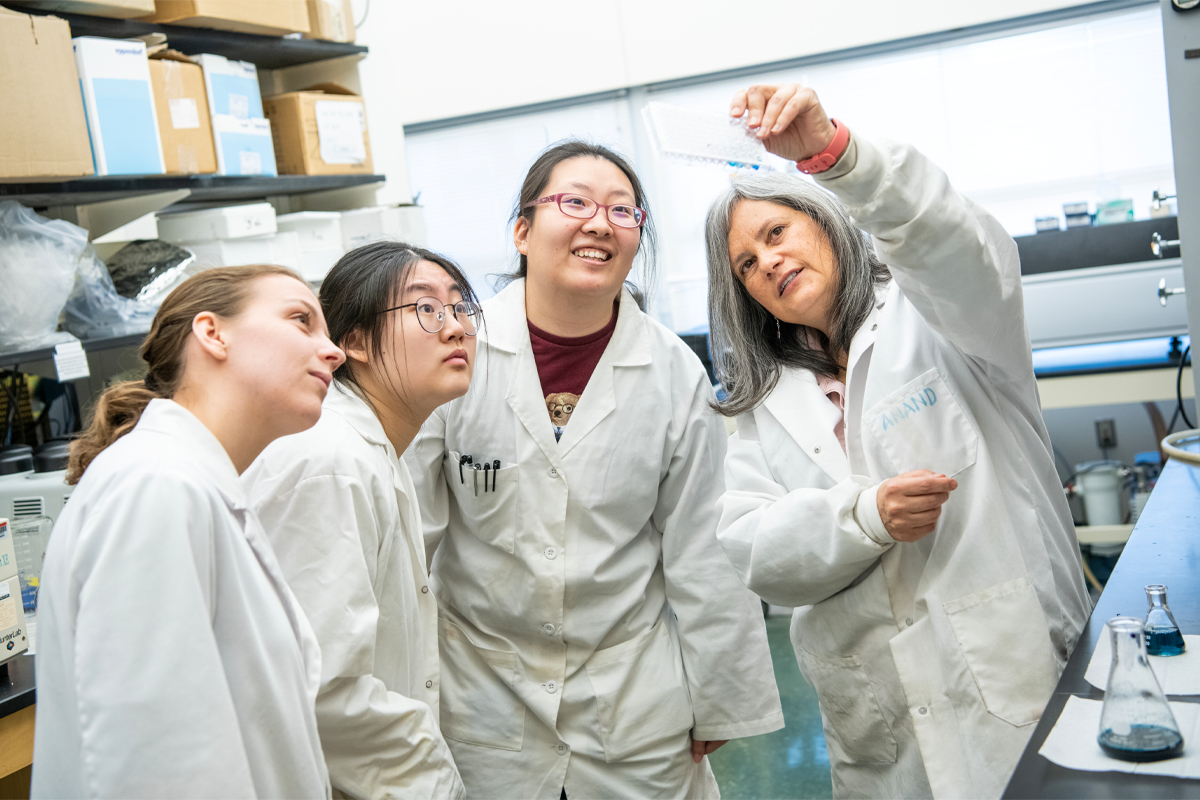How firm thy mentorship
Dedicated Ohio State mentors work to empower students and nurture their success to help Buckeyes achieve their academic and personal goals

Whether you’re a first-generation student or just looking for professional advice, everyone can benefit from some extra guidance. Having a mentor can open a world of opportunities you might never have obtained.
“As a mentee, you can expect to receive guidance and insight, but you should also be open to providing your own ideas, thoughts, and insight to your mentor,” says Khalil Clements ’19. “Developing an intentional, fluid, give-and-take dynamic will be beneficial for both sides.”
These recent grads have achieved tremendous accomplishments, made possible through the guidance of dedicated Ohio State mentors. These Buckeyes describe how they got the most out of their mentor relationships and how other mentees can do the same.
Don't rush success
At Ohio State, "I was very much the student who was very motivated, but very headstrong and wanting to get in there and get it done. And I always wanted the next best thing," Taylor Wallace MS '07 and PhD '10 says. "And (Monica Giusti) really taught me to slow down."
Taylor and Giusti, a faculty member in the College of Food, Agricultural, and Environmental Sciences, worked on Anthocyanins in Health and Disease, a published book that explores the pigments in foods and their properties.
He says Giusti puts a lot of energy and effort into her students, building personal relationships and encouraging them to participate in extracurricular activities that prepare them for life after graduation.
A food scientist and author, Taylor has made numerous media appearances and runs Think Healthy Group, his own research and consulting business. Taylor also teaches as an adjunct faculty member at George Mason University. Right now, he is working on a large child nutrition study in Guatemala.
Taylor’s advice to mentees: “Don’t let your energy and drive for success get in the way of taking in the small details, as those really matter in the long-run. Listen and ask lots of questions. You will be surprised at the knowledge you gain from not only taking in advice but also digging deeper.”
Making your impact
"I felt like I was struggling with my major," Nnaemeka Anene ’20 recalls. "I tried to hold myself to a high standard academically, so I didn't feel like I was doing as well as I could."
Nnaemeka turned to Daniel Thomas ’03, ’19 MSC for advice. They talked about Nnaemeka’s goal to have a lasting impact after graduation and how his major, materials science and engineering, fit into that.
Thomas didn't tell him what to do, Nnaemeka says, but walked him through steps that could help him achieve his goals, emphasizing the importance of honesty, vulnerability and trust. Like many college students, Nnaemeka struggled to adapt to the freedom that comes from leaving home, but he came to trust Thomas as a person he could turn to and count on in his new home away from home.
Nnaemeka ended up sticking with his major which eventually led to a job with the flexibility he needed to invest in his Dayton and Columbus communities. After graduation, Nnaemeka started a nonprofit called Things That Matter and continues to find meaning and value in what he does.
Nnaemeka’s advice to mentees: “The best advice I ever received came when I was able to be fully transparent with both myself and my mentor. To truly maximize these relationships, we have to be willing to face both our achievements — and opportunities for improvement — with someone we truly trust.”

Motivation for innovation
Laura Wallace ’15 MA, ’19 PhD and her mentor Kentaro Fujita worked on numerous projects together throughout Laura’s time at Ohio State. In one study, they combined their research interests to examine people’s motivation for social change and how that might conflict with their motivation for keeping things the same.
Laura says her mentor relationship helped her develop independence while being challenged academically. Fujita was committed to building a community in his research group, encouraging networking among mentees and helping them develop professionally, she says.
Today, Laura is a principal researcher at the Roman Family Center for Decision Research at the University of Chicago.
Laura’s advice to mentees: “Keep lines of communication open. Proactively share what you are looking for and ask for what you need. Sometimes the power difference makes it feel uncomfortable to do this, but both parties will benefit from not having to try to read each other’s minds.”
Doing graduate-level research as an undergrad
As a first-generation American and first-generation college student, Anthony Dujmovic '22 needed guidance. During his junior year, Carmen Swain ’97 MA, ’07 PhD was inspired by Anthony’s background and drive and took him under her wing.
Swain and Anthony studied the effectiveness of a fitness system developed by Peggy Mills, owner of Valemee Fitness in Dublin, Ohio. This inclusive gym promotes fitness, independence and self-efficacy in adults with intellectual disabilities.
Anthony’s study had nearly 100% participation, and the results showed Mills’ approach increased fitness, independence and self-efficacy across the board with clients. Mills is using this validation to spread her system to gyms across Central Ohio and, potentially, the nation.
“This is the most meaningful research I’ve ever done, and I never would have done it without Anthony,” Swain says. “The value of mentorship is you show someone a direction."
Anthony’s advice to mentees: “You have to get involved and get out of your comfort zone. It prepares you for the real world because nobody will baby you your whole life. Ohio State is unmatched and getting your foot in the door whether in research or academics or whatever your interest is in is worth it. The faculty here really are welcoming and want to help you.”
Labs of Life brings student research to life
Sarah Kessler ’14 and Elan Liber ’12 also had the opportunity to work with Swain but through Labs of Life, a program she created to show the community the value of research.
As an undergraduate, Sarah was able to oversee her own studies, like her barefoot running study, under Swain’s guidance. Sarah says the experience not only helped her get into Ohio State’s selective exercise science program but sparked her love for research, a path she continued at the University of Michigan, the University of Queensland in Australia and Harvard University.
Today, Sarah is the head athletic performance coach for the WNBA’s Indiana Fever. Her success is a reflection of her hard work and dedication at Ohio State. “That’s a time in your life when you’re young and stressed, and Carmen was a port in the storm. She was so kind in helping you through all the stages of the research process. Without a doubt that experience sent me down this path,” says Sarah.
Elan began at Labs in Life as a sophomore and became lab manager. He worked with hundreds of participants, published two studies and won awards for research about obesity and lack of exercise in boys. He graduated with an exercise physiology degree, earned a master's in public health at UCLA and now works as an entrepreneur and marketing professional in California.
"I realized what I loved the most about the work I had done with Carmen was being able to make a significant impact on people's lives," Elan says. “With her it was always, 'Yes, you really can do this.' She was incredible. We're still very close.”